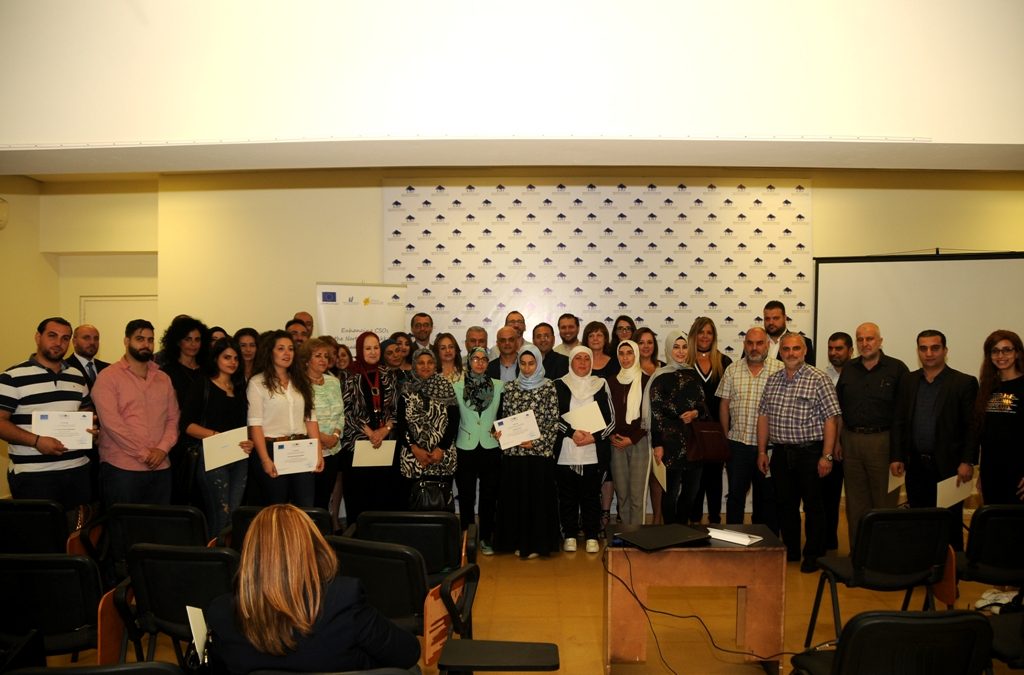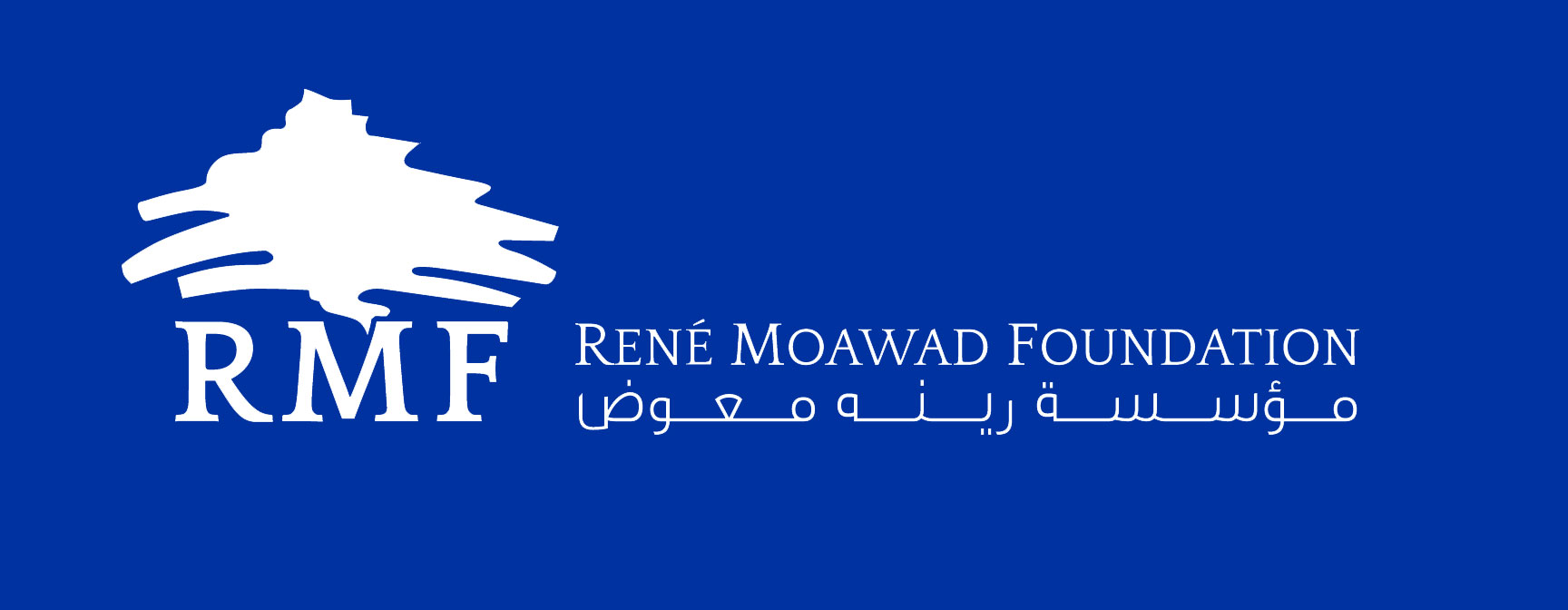The René Moawad Foundation organized the closing ceremony of the project “Strengthening Civil Society Organizations in the North and Akkar for Sustainable Development” funded by the European Union, in cooperation with Saint Joseph University’s Lebanese School for Social Training. The ceremony was held in the conference room of the René Moawad Foundation building in Mejdlaya on Wednesday 30 May, in the presence of Representatives from the European Union Delegation in Beirut, Mr. Gianandrea Villa and Mr. José Luis Vinuesa Santamaria, Head of the Economy and Local Development Department and Head of the Sustainable Development Section of the EU Delegation to Lebanon, respectively, in addition to the Director of the Lebanese School for Social Training Ms. Marise Tannous, the General director of the René Moawad Foundation Mr. Nabil Moawad, and members and representatives of the associations involved in the project.
The ceremony began with a detailed technical presentation by René Moawad Foundation’s project coordinator for this project, Ms. Jano Barakat, who explained the project’s objectives and main highlights. In this context, it should be noted that the project’s aim was to build the capacity of civil society organizations in the North and Akkar districts and make their work more sustainable in the long run, as well as providing them the opportunity to submit project proposals with financing reaching a total value of 40,000 euros.
Head of the Sustainable Development Section of the EU Delegation, Mr. José Luis Vinuesa Santamaria, expressed his pleasure at participating in the closing ceremony of this important but short-term project, considering that the objective of the project has been fulfilled, which is the capacity-building of civil society organizations in the North and Akkar, something of exceptional importance to the European Union. “This project’s importance lies in building the capacity of organizations and serving community members by strengthening social partnership and protecting and supporting partnership with the public and private sectors,” said Santamaria.
Then he expressed the pleasure of the European Union to be financially supporting the implementation of a series of capacity-training programs aimed at building the capacity of associations to write and submit projects, marketing, communication, human resources management, strategies and other issues that help bridge the gaps and needs of local community organizations. He spoke about the importance of the role of civil society organizations in the formulation of local policies and their efforts to implement these policies. “I hope that these initiatives will be repeated by the organizations that participated in these trainings”, stressing the importance of networking between those organizations.
On her part, Ms. Marise Tannous, Director of the Lebanese School of Social Training at Saint Joseph University, spoke about her experience working in cooperation with the René Moawad Foundation: “When the René Moawad Foundation asked me to apply for the involvement of Saint Joseph University’s Lebanese School for Social Training, I didn’t hesitate for one moment to participate, and this is what any of us would have done for such projects.”
And regarding the importance of the project, she added: “First of all, our tasks at the Lebanese School of Social Training intersect with the functions of the Rene Moawad Foundation in the service of man and society.” Secondly, the mutual cooperation between academics and players on the ground can result in the integration of competencies for formulating and implementing successful and effective projects. Finally, the North Lebanon region deserves special attention from each of us, given its social and developmental needs as well as the capabilities and resources that must be strengthened and encouraged. ” She also pointed out that “the primary motivation for our commitment to this project lies in the hope we place in this country, especially in its active forces, that is the associations that struggle every day and by all means available to them to realize people’s dignity and preserve their rights.”
Then the General Director of the René Moawad Foundation, Mr. Nabil Moawad meanwhile stressed on “the importance of the language spoken by everyone here today, the language of civil society”. He continued by saying that “this is the language that we have become accustomed to and which Lebanon is now lacking, which is the language that we seek to develop and to set as an example for the private and public sector.” I know well that this project today, through the training of Saint Joseph University, is very important. It’s possible that some people were disappointed at being unable to get the necessary funding, and I understand their position. But I assure them that the future lies ahead of us and of them, and that the skills acquired by the associations during these trainings allows them today to obtain donations by donors.” He then added: “I am proud today to say that some of these associations have become brilliant, and that this ceremony is not the end but the beginning because we have discovered the enthusiasm of these organizations and their haste for development work and public affairs.” We hope to be together, hand in hand, in future projects, especially that today you are able to apply on your own to projects launched by any donor, including the European Union. ”
He concluded by saying that “In this context, I am addressing the European Union, the first donor to Lebanon, to tell them that the Rene Moawad Foundation has acquired many experiences through its involvement and implementation of a large number of projects funded by it. I also thank the St. Joseph University, which worked with great passion and showed us that academics, contrary to what is rumored of them being confined within University walls, they were the initiators on all levels. I thank the participating associations and thank the team of the René Moawad Foundation on its completion of this project.”
Then Mr. Zaher Obeid, the representative of the “Al-Hadatha” Association and a spokesman for the participating associations in the project, gave a speech saying that “Sustainable development is achieved by meeting the needs of people and the local community and by finding the appropriate means and methods to advance our regions by reinforcing the partnership between civil society organizations,” He added: “The training received by the associations had a positive impact on the workflow. In the “Al-Hadatha” Association, for example, we observed great progress and development in the team in terms of acquired capabilities and communication skills. The ceremony ended with the distribution of certificates to participating associations followed by a cocktail gathering.


